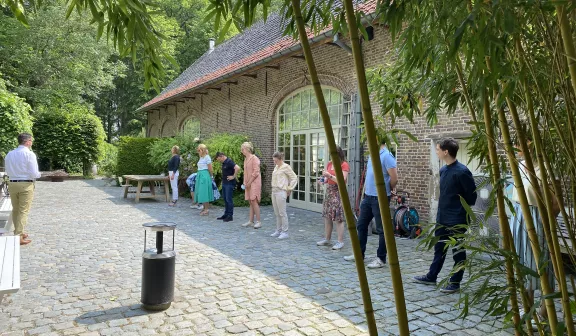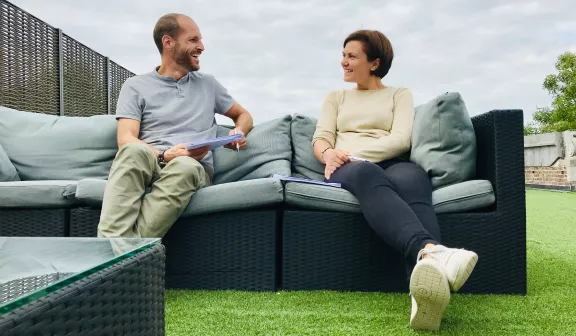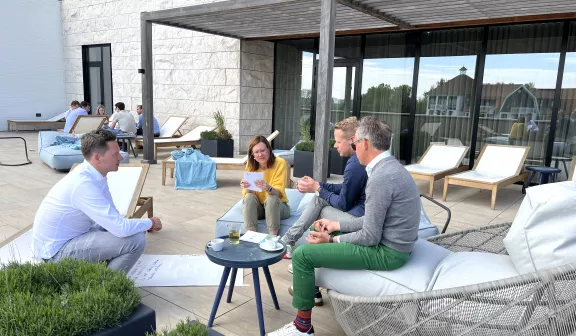Coach in the Spotlight:
Daring to Leap with Johan Van Eeckhout
Coaching The Shift has been guiding individuals, teams, and organisations for 8 years toward strategic shifts through increased reflection, communication, and collaboration—all with a team of top coaches! This month, we put our coach Johan Van Eeckhout in the spotlight! A powerful storyteller who seamlessly drives shifts in leaders and executive teams. Discover how Johan transformed himself from skydiver to professional coach!

Coaching The Shift has been guiding individuals, teams, and organisations for 8 years toward strategic shifts through increased reflection, communication, and collaboration—together with a team of top coaches!
This week, we introduce Johan Van Eeckhout, an experienced leadership coach and executive coaching expert.
With a background as a trainer in strategic learning and development within the energy sector, Johan brings thousands of hours of experience as a coach, team coach, and trainer. As a former coach for elite sports teams, he is equally at home in both operational and management environments.
Through keen observation and the courage to hold up a mirror, Johan has created significant shifts at all organisational levels. He is known at Coaching The Shift as a powerful storyteller with a talent for developing tailored transformation and training programmes.
For several years, Johan has focused on coaching leaders and executive teams on strategic topics and their impact on people within the organisation. He facilitates change at the identity level:
"Who do you want to be as a team, as a leader, and as a person to achieve the desired strategic shifts?"
Curious about Johan’s story? Discover more about:
- How he entered the world of coaching
- What he wants to contribute to the world as a coach
- His mission and motivation as a coach
- Misconceptions about executive coaching he wants to dispel
- Common pitfalls he observes as a leadership coach
- Tips for beginner coaches
- What he would do differently if starting again as a coach
- Coaching books he recommends
- An inspiring quote he lives by
- The values and aspirations he carries into 2024
How did you enter the world of coaching?
In a nutshell: I was responsible for learning and development and the personal growth of employees in the energy sector. I realised that training indeed offered opportunities to develop people, but I still felt something was missing.
After exploring alternative development methods, I eventually came across mentorship. While I learned a lot there, I felt that something more was needed.
That’s how I ultimately discovered coaching, and more specifically executive coaching. It was a true revelation for me. Coaching can be tailor-made, my style, my presence, my approach: it becomes personalised!
Initially, I enrolled in a professional coach training with the idea: “Now I can help people develop better.” Later, I realised that the coaching training brought about a personal transformation in myself. The slogan “Everything starts with yourself” truly resonated in this journey.
What do you want to contribute to the world as a coach?
“Un autre regard” – Another Perspective: a new insight, a different way of looking at the world. There is a real need today to shift from an individualistic perspective to a collective one. It’s time to move from short-term, urgency-driven thinking to a longer-term approach.
By allowing people to take on different perspectives, towards themselves and the situations they face, we increase awareness and initiate a more sustainable movement, which ultimately benefits many more stakeholders.
But being aware of something doesn’t necessarily mean it feels that way. There is still a difference between knowing what to do and actually doing it with full conviction. The question then becomes: “Once this awareness is there, what is still holding you back from making the desired shift?”
As a coach for leaders, you may sometimes offer advice. But that advice is not binding, it’s simply a way of looking at things. How the coachee responds then helps uncover even deeper insights. Where is the real issue? What is the true stumbling block?
A literal translation in our language:
-
Savoir-faire: Knowing what and how to do something.
Savoir-être: Who am I in this role? Who do I want to be in it?As a coach for leaders, we work a lot on these layers. I dare say that we create the most impact on the second layer, namely: “Who am I (right now)? And who do I want to increasingly become in the situation or context I am currently in?” Knowledge can be found anywhere. But how can you truly be who you want to be?
What is your mission & motivation as a coach?
For me, it has been a personal journey to discover what truly drives me. I’ve realised I have a strong drive to get people moving, both in my work and beyond.
I once started skydiving from a place of ego, wanting to prove myself. But it became a life-changing experience, far deeper than just the thrill of the jump. I continued pursuing it for six or seven years until I finally had a real breakthrough.
From then on, I fully invested in skydiving as a sport. That often meant dedicating Friday evening to Sunday evening to learning the craft, in all weather conditions. Together with some fellow enthusiasts, we eventually started our own skydiving school, where I discovered my passion for helping people take the leap.
Daring to jump…
First, literally. But later, it revealed a much deeper lesson. There are many parallels between coaching leaders and what I experienced in skydiving. During the first few jumps, you are quite directive, telling the learner which steps to take and when. But as they gain experience, the goal is to gradually hand over autonomy.
I soon became the instructor people came to for mental obstacles. Unconsciously, I was already practicing a form of coaching. I would sit with them, ask questions like: “What’s holding you back? What’s in your way?” It became more about dialogue and relationship-building than just the technicalities.
I then began guiding individuals and groups with prior experience. It became the perfect coaching lab to experiment with what worked and what didn’t. I’m not someone who simply believes in theory, I need to experience and apply it myself. This was where I developed my own executive coaching style.
Eventually, I had the opportunity to work with several world champions in skydiving, even co-organising the French record. There, I saw how my coaching role complemented the technical mastery of the best skydivers worldwide, creating an exceptionally effective dynamic.
Which misconception about executive coaching would you like to dispel?
Coaching is not a quick fix.
There is often the misconception that coaching provides a ready-made plan for achieving success. For me, that is not what coaching is really about. Executive coaching goes much deeper, focusing on the question: “How can I sustainably achieve what I want to accomplish?”
What pitfalls do you often see as a coach for leaders?
The label “coach” still carries the connotation of “I’m not doing well” or “I have a problem”, but that is not the case. Coaching is about personal development, not problem-solving.
The biggest pitfall I see for many leaders is seeking a quick fix or a temporary patch to cover up an issue (and the underlying emotions). This is not always the right approach. Executive coaching dives deeper to explore what lies beneath: What is the bigger learning question as a person or as a leader? Listen to your body. Where does this feeling come from? What is this a symptom of?
What tip would you give to aspiring coaches?
More and more coaches are emerging, often driven by a genuine desire to help people—which is admirable, but not always sufficient. Being a coach is rewarding, but it requires more than just coaching skills.
In addition to the coach role, you wear many other hats: sales, marketing, organisation, finance, accounting… Balancing the trust relationship between yourself, your client, and the coachee(s) is challenging. Selling yourself as a coach is also an important part, and there is a big difference between the commercial role and the role of an impartial coach in dialogue with the coachee and their manager regarding the desired shift.
The same applies to internal coaches. Often, you are also a manager or work on behalf of a leader. How do you balance these roles? How do you remain credible in providing psychological safety for the coachee while working under the direction of leadership?
For me, two elements are essential:
- Ethics: How can you behave ethically as a coach without role confusion?
- Confidentiality: How do you maintain a safe environment, regardless of the client?
Building a trust relationship with a client is not the same as building one with a coachee.
What would you do differently if you could start over as a coach?
I look back with satisfaction on the path I’ve already taken as a coach. One thing I might do differently is better anticipate everything that coaching entails. I would probably invest even more in developing myself in areas beyond pure coaching.
Welk coaching boek beveel je aan?
“Transformational Presence” by Alan Seale
There is tremendous transformative power in full presence. It allows you to truly connect—with yourself, with others, and with your environment. Alan Seale’s book provides a practical guide to greater awareness, connection, intention, and transformational action. It helps coaches and leaders communicate in a clear and authentic way.
What is an inspiring quote for you?
“The situation as you describe it now, how much of it is a mirror to yourself?”
I find this quote very interesting because it encourages deep self-reflection. If the situation you describe is a mirror, what do you see in it? It challenges our worldview and perception, sometimes bringing calming insights, and other times confronting truths.

Which values & aspirations will you carry into 2024?
The value I will continue to uphold is integrity. That is a foundation I will never compromise. Alongside this, I prioritise integrity with time. We live in a world that moves very fast, and I believe it’s crucial to take time deliberately. Otherwise, I fear we risk running past ourselves.
For example, we are often asked to start coaching programmes as quickly as possible. But why the rush? Why tomorrow and not yesterday? Isn’t that the “quick fix” creeping in?
Finally, I increasingly believe in the value of executive coaching: strategically coaching leaders and executive teams to bridge the gap between strategy (rational) and operations (relational and structural), step by step. This way, less energy is wasted trying to force situations, and changes become more sustainable.
Other relevant articles












